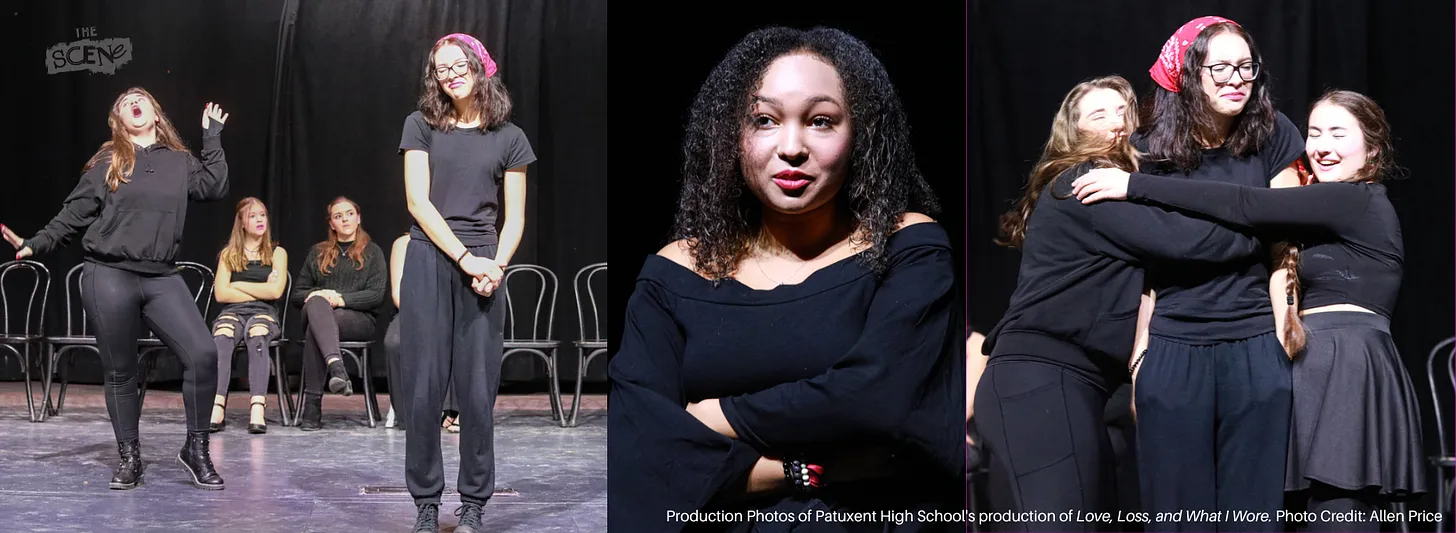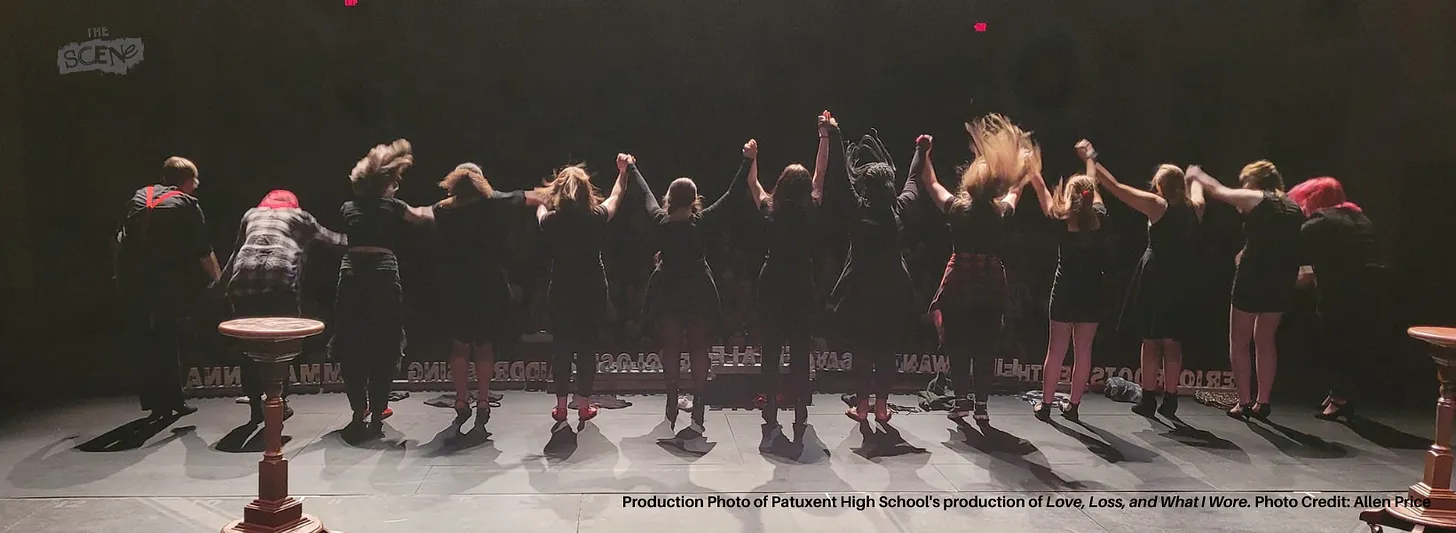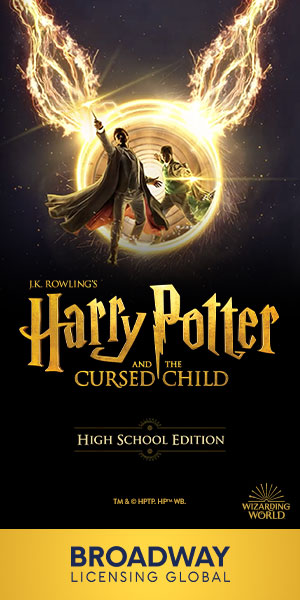Over the past few weeks, we have heard from lots of Theatre Educators asking for advice on selecting and producing one-acts. The Scene reached out to Allen Price, Theatre Director at Patuxent High School in Lusby, MD; Phill Milner, Theatre Teacher at Tupelo High School in Tupelo, MS; and Mari Tortorice, Assistant Theatre Teacher at Ridge Point High School in Missouri City, TX, whose one-act productions were selected to perform at last summer’s International Thespian Festival. Here is their expert advice:
THE SCENE: Thank you three for speaking with us today. To begin, what do you look for when selecting a one-act for your program?
ALLEN: First, let me say this in the nicest possible way, but I hate looking for a one-act. I’m looking for so many particular aspects. I want a play that explores different styles of theater, I want a play that pushes boundaries in content and acting in order to push my actors, I want a play that has strong writing, I want a play that challenges the audience to engage and think, I’m looking for a play that really hasn’t been done in the one act realm, and I want a play that will challenge me as a director and push my creativity in new directions.
PHILL: The most important thing to me when choosing any show is whether or not my students enjoy it. If they give the green light, then I know we can make the show work.
MARI: One thing I look for when selecting a one-act is the diversity and student talent within the organization as my starting point. After this, I narrow it down to comedic versus dramatic and allow the students to vote or have an opinion on some of my options. I want the program to be collaborative and encourage the students’ creative thinking and interests. While selecting this one-act, I had two senior students who suggested the show originally and wanted to try their hand at directing.
THE SCENE: At this year’s ITF Festival, Allen brought the play Love, Loss, and What I Wore by Nora Ephron and Delia Ephron , Phill brought That’s Not How I Remember Itby Don Zolidis and Mari brought Empowered: How One Girl Scout Nearly Destroyed the World’s Economy also by Don Zolidis. How did your students respond to the play? What do you think your students learned by working on the show?
ALLEN: My students took to Love, Loss and What I Wore instantly. They loved the writing and the message of it. The play couldn’t have been a more perfect choice for the group of students I selected.
PHILL: My students fell in love with the show after the first reading. They found it funny, and they were incredibly excited to play all of the unique characters. The thing the students learned the most was the clothing that was worn during the 80s. They had a blast finding outfits that fit their characters and the time period.
MARI: The student response to this play was overwhelmingly positive. They really enjoyed the comedy of the piece and were excited to try different comedic outlets instead of intensive dramatic pieces that were done in the previous year.

THE SCENE: What is the biggest challenge you faced when producing and directing a one-act play? How did you overcome this challenge?
ALLEN: For me, it is always picking the right play. Sometimes the difficulty can be the short amount of time we get to spend on it. We can feel rushed.
PHILL: Time always seems to be the issue. There is never enough of it. When you add the element of traveling with a show, it can be even more stressful, and finding ways to use your time more wisely in all of the different theatre elements is such a challenge. I have found that accepting help from parents and the community has made things incredibly simpler. Parents are often excited to volunteer if you give them an opportunity to do so.
MARI: One of the biggest challenges was balancing all of the schedules. Because the production was predominantly student-run with me supervising and helping with difficult points, it was up to the students to use the campus space or off-campus spaces to the best of their ability. Another challenge we faced was the cast being mostly younger freshmen and sophomores, so the experience level was lower than we normally had for a one-act process. These challenges were adjusted and fixed with communication and a lot of responsibility on the older students to be beacons for the younger students.
THE SCENE: What advice would you provide to fellow educators looking to mount a successful one-act?
ALLEN: Start early and treat it like a full production. Our festival is in January, and we will typically cast the one-act in June. Actors will have the whole summer to think about their parts and work on characterization. The student director and I will have a couple meetings about set and blocking before school starts. The one-act is such an invaluable opportunity to advance an actor’s skills and it shouldn’t be treated as less because it is a shorter production. Allow yourself time to explore.
PHILL: Do not make it your primary goal to choose a “competition show” or a “sophisticated drama” that you think the judges will find impressive. That’s fine, but I have learned that the students will do their best work if they genuinely love the show. Silly comedies are just as good if the students whole-heartedly support it.
MARI: One of the biggest pieces of advice would be to stay organized from the beginning. You have to really map out what set pieces and set design you can travel with and what you cannot. Also, in regard to traveling with the one-act (like we did for Texas Thespian Festival as well as International Thespian Festival), reach out to the nearby schools to the convention center to make travel easier on yourself! People are willing to help you out, you just have to ask and research for it.
THE SCENE: Finally, what other one-act play titles you would recommend?
ALLEN: I love Aaron Posner. He doesn’t really write one-acts. I used the first act of a couple of his plays to do as one-acts. His anger and passion for art I find very inspiring. Also, he curses a lot and I like that.
PHILL: Cheating Death by Karmon Klitgaard, The Hallmarks of Horror by Peter Bloedel, and They Eat Sunshine, Not Zebras by Dara Murphy have all been great shows that we have done in the past.
MARI: This is a great question! I have a few off the top of my head The God Committee by Mark St. Germain; the boy who stole the stars by Julian Wiles; and 4 A.M. by Jonathan Dorf.
THE SCENE: Thank you all for taking the time to speak with us today! I’m sure your advice will be helpful to educators across the country. We are looking forward to seeing what you do next!










